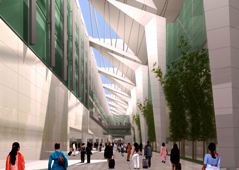 The GMR and GVK groups, which run the Delhi and the Mumbai airports, respectively, have strongly opposed a plan to increase air traffic rights between India and Abu Dhabi, fearing an adverse impact on their hub prospects.
The GMR and GVK groups, which run the Delhi and the Mumbai airports, respectively, have strongly opposed a plan to increase air traffic rights between India and Abu Dhabi, fearing an adverse impact on their hub prospects.
The two companies have taken up the issue of opening up the skies to United Arab Emirates-based Etihad Airways with the civil aviation ministry, which would negotiate an air service agreement with UAE next week.
Air service agreements dictate the frequency, number of seats and destinations for airlines operating between two countries.
Typically, the benefits are reciprocal in nature.
The Delhi airport's opposition comes in the wake of Jet Airways' plans to seek 40,000 additional seats between India and Abu Dhabi.
A Jet Airways spokesperson said, “Jet Airways has evaluated the business, tourism and travel potential of the Indian market on the basis of a comprehensive assessment and has, accordingly, applied for the grant of additional capacity entitlements to increase services to Abu Dhabi.
The airline has a network strategy and a fleet induction plan to support this growth.
The expansion is intended to provide a wider consumer choice to the Indian traveller by connecting 23 cities across the country to the international market, with a proven Indian product.”
“Through the last nine years, Jet Airways has emerged as one of India’s best known international service brands, which has enabled the airline to not only compete successfully with foreign carriers for a share of the international traffic, but also grow its market share in a highly competitive global environment.
Jet Airways is of the belief that growth by an Indian carrier with nationwide presence would further facilitate tourism inflows to the country and promote trade and commerce,” the spokesperson added.
Currently, airlines from both sides are allowed 13,000 seats a week.
Following Etihad’s acquisition of stake in Jet Airways, the UAE-based airline would tap into the Indian market to feed its global routes.
This has led to jitters among Indian airlines and airports.
The move, aviation sources said, would impact all other airlines, especially Air India, which flies to Europe and the US.
“Not even Emirates has been allowed so many seats at one go. Etihad can demand a similar number of additional seats,” said an executive at a private airline.
Jet Airways flies to Abu Dhabi from Mumbai and Delhi, while Etihad connects 10
That these airlines are demanding additional seats and opening of new routes has led to concern for the Mumbai and Delhi airports, as this would mean passengers would have to travel through two cities to connect to international destinations.
On such matters, typically, the civil aviation ministry obtains the views of the stakeholders concerned, including airport operators.
“The Airports Authority of India, as well as private airport operators, has invested heavily in the modernisation of India’s gateway airports, which are now well equipped to handle transfer traffic on a large scale.
The two major gateway airports, Delhi and Mumbai, currently account for about 50 per cent of international capacity.
The development of a hub at closer proximity would adversely impact further growth of these gateways as hubs.
The recovery of investment and growth of these airports, as well the benefits associated with a gateway airport, would also have an adverse impact,” a Delhi International Airport spokesperson said in an email response.
“As an airport operator, we have evaluated the current capacity between India and Abu Dhabi and have raised our concerns/reservations in this regard,” he added.
“We have expressed our reservations (about increasing traffic rights),” said a Mumbai International Airport spokesperson.
The Delhi airport has been modernised at a cost of Rs 12,857 crore (Rs 128.57 billion).
Currently, it is the busiest airport in India, handling about 900 flights a day, including 200 international movements. Last year, it handled 35.71 million international movements.
The cost of modernising the Mumbai airport is pegged at Rs 12,380 crore (Rs 123.8 billion).
The airport handles 750 daily movements, including 200 international ones.
Last year, Prime Minister Manmohan Singh had announced plans to develop Delhi and Chennai as aviation hubs.
The aviation ministry had prepared a consultation paper, outlining measures to encourage airlines to increase flights from Indian hubs, as well as passenger traffic.
According to the civil aviation ministry data, in 201011, 37 million passengers flew to/from India.
Of these, 11.4 million were connected by hubs outside India.
This essentially means 11.4 million had flown via transit points such as Dubai and Singapore, instead of taking a direct flight from India.












 © 2025
© 2025